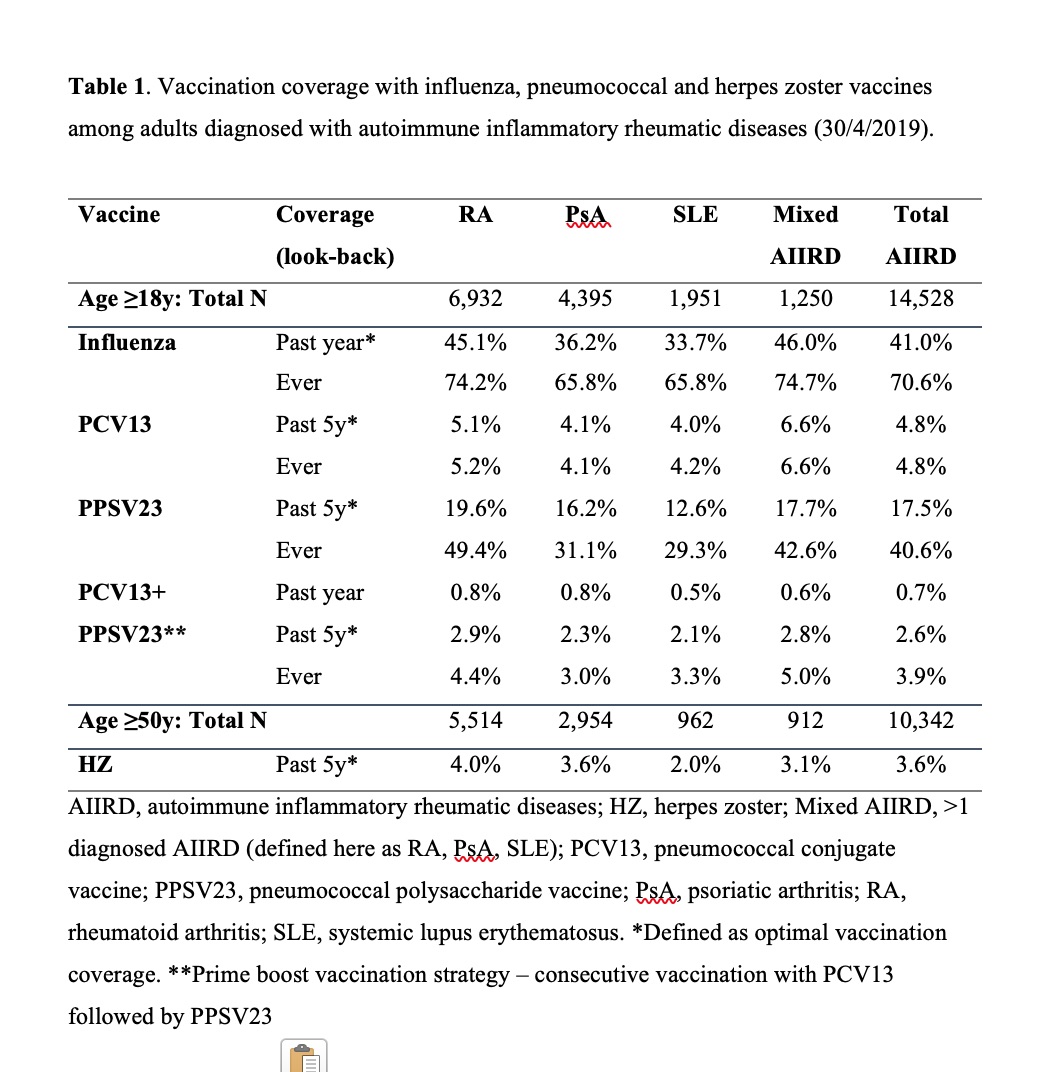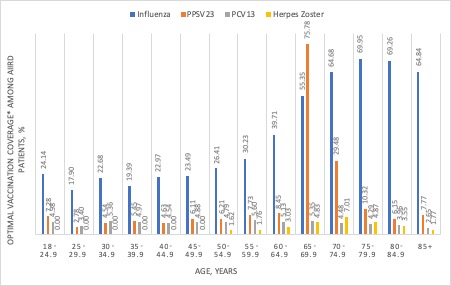Session Information
Date: Saturday, November 7, 2020
Title: Epidemiology & Public Health Poster II: OA, Osteoporosis, & Other Rheumatic Disease
Session Type: Poster Session B
Session Time: 9:00AM-11:00AM
Background/Purpose: Autoimmune inflammatory rheumatic diseases (AIIRD) increase the susceptibility to infections. Immunisation against vaccine-preventable diseases is recommended for patients with AIIRD by most international medical societies. Yet, evidence points to a suboptimal adherence to vaccination recommendations among the AIIRD population.1-3
The purpose of this study is to assess the vaccination coverage with influenza, pneumococcal and herpes zoster (HZ) vaccines among adult patients with AIIRD in a real-world setting.
Methods: A retrospective cross-sectional study was performed using the databases of Maccabi Healthcare Services (MHS), a large healthcare provider in Israel. The AIIRD population was defined as adults (≥ 18 years old) alive on 30/04/2019, with ≥12 months of continuous enrolment, diagnosed with rheumatoid arthritis (RA), psoriatic arthritis (PsA) and systemic lupus erythematosus (SLE). Point prevalence rates among MHS members were age-adjusted. Optimal coverage was defined as vaccination documented in the past year for influenza and 5 years for pneumococcal (PPSV23 and/or PCV13) and HZ vaccines.
Results: A total of 14,528 AIIRD patients were included. Overall, 41.0%, 17.5%, 4.8%, and 3.6% of AIIRD patients had optimal influenza, PPSV23, PCV13 and HZ vaccination coverage, respectively (Table 1). The highest age-specific vaccination rates were observed in age group 75-79y for influenza, 65-69y for PPSV23, 55-59y for PCV13, and 70-74y for HZ respectively (Figure 2). Influenza vaccination was significantly (p< 0.05) associated with older age (≥60y) after adjusting for patient characteristics and potential confounders. Among the elderly (≥65y), AIIRD patients had comparable vaccine coverage rates to those reported in the general population in Israel4 for influenza (past year: 63.2% vs. 61.0%) and PPSV23 (past 5y or at least once since age 65y: 83.4% vs. 77.7%). The uptake of PCV13 and HZ vaccines was remarkably low in all age groups.
Conclusion: This study provides real-world evidence of suboptimal influenza, pneumococcal, and HZ vaccination coverage of patients with AIIRD, in particular among younger adults. There remains significant scope to improve uptake of vaccinations in patients with AIIRD.
References:
- Hmamouchi I, et al. Vaccine 2015; 33:1446.
- Costello R, et al. PLoS One 2016; 11:e0153848.
- Subesinghe S, et al. BMC Musculoskelet Disord 2016; 17:322.
- Calderon-Margalit R, et al. National Program for Quality Indicators in Community Healthcare in Israel, Report 2013-2017. Jerusalem: School of Public Health and Community Medicine, Hebrew University-Hadassah; 2017.
 Table 1. Vaccination coverage with influenza, pneumococcal and herpes zoster vaccines among adults diagnosed with autoimmune inflammatory rheumatic diseases (30/4/2019).
Table 1. Vaccination coverage with influenza, pneumococcal and herpes zoster vaccines among adults diagnosed with autoimmune inflammatory rheumatic diseases (30/4/2019).
 Figure 1. Age-specific optimal vaccination coverage with influenza, pneumococcal and herpes zoster vaccines among adults diagnosed with autoimmune inflammatory rheumatic diseases (30/4/2019). AIIRD, autoimmune inflammatory rheumatic diseases (defined here as rheumatoid arthritis, psoriatic arthritis, and/or systemic lupus erythematosus); PCV13, pneumococcal conjugate vaccine; PPSV23, pneumococcal polysaccharide vaccine. *Optimal coverage defined as vaccination in the past year for influenza, and vaccination in the past 5 years for pneumococcal and herpes zoster vaccines.
Figure 1. Age-specific optimal vaccination coverage with influenza, pneumococcal and herpes zoster vaccines among adults diagnosed with autoimmune inflammatory rheumatic diseases (30/4/2019). AIIRD, autoimmune inflammatory rheumatic diseases (defined here as rheumatoid arthritis, psoriatic arthritis, and/or systemic lupus erythematosus); PCV13, pneumococcal conjugate vaccine; PPSV23, pneumococcal polysaccharide vaccine. *Optimal coverage defined as vaccination in the past year for influenza, and vaccination in the past 5 years for pneumococcal and herpes zoster vaccines.
To cite this abstract in AMA style:
Furer V, Weil C, Orin M, Chodick G, Shalev V, Fisher Shoval Y, Cohen R, Elkayam O. Suboptimal Vaccination Coverage with Influenza, Pneumococcal and Herpes Zoster Vaccines Among Adult Patients with Autoimmune Inflammatory Rheumatic Diseases in a Nationwide Health Care Plan [abstract]. Arthritis Rheumatol. 2020; 72 (suppl 10). https://acrabstracts.org/abstract/suboptimal-vaccination-coverage-with-influenza-pneumococcal-and-herpes-zoster-vaccines-among-adult-patients-with-autoimmune-inflammatory-rheumatic-diseases-in-a-nationwide-health-care-plan/. Accessed .« Back to ACR Convergence 2020
ACR Meeting Abstracts - https://acrabstracts.org/abstract/suboptimal-vaccination-coverage-with-influenza-pneumococcal-and-herpes-zoster-vaccines-among-adult-patients-with-autoimmune-inflammatory-rheumatic-diseases-in-a-nationwide-health-care-plan/
